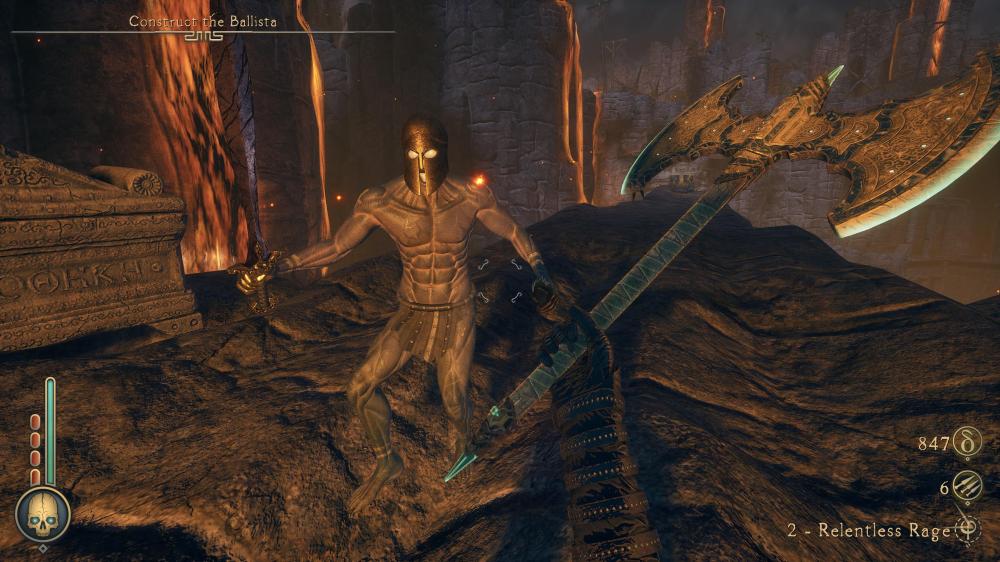Perish is the offspring of DOOM and Hades – Review – WGB

Perish is basically the weird love child of DOOM Eternal and Hades, combining the intense action and heavy-metal riffs of the former with the roguelike structure and mythological storytelling of the latter. But like real-world genetics, just because you combine the best possible DNA doesn’t mean you’re going to end up with something better than the sum of its parts. Perish isn’t even close to being as amazing as its parents, but if you take it out of the shadow of those two titans it’s a decent budget roguelike shooter in its own right.
The Parish hasn’t actually been available on PC since late last year. However, I forgot about it, which is why I’m reviewing its console releases here on Xbox and PlayStation hardware.
Progression is handled through a barebones roguelike structure where you die, hopefully get a permanent upgrade and then try again this time with the aim of making it a step or two further. Every time you successfully complete an objective you’ll choose from a selection of power-boosting cards, perhaps adding fire damage to your throwing knife or making your kick attack extra powerful. Some cards are useful and synergize well with other cards or certain weapons, so the most successful runs are usually because you luck out making the right choice. The other cards are clearly useless. Sadly, there is only a small pool of these cards to choose from.
Available at: PC, xbox, Play Station
Reviewed on: PS5
Price: £15.99/$19.99
Developed by: Item 42
Published by: HandyGames
Review code provided by publisher
Each enemy killed and each objective completed adds Denke to your bank account which you can use to buy rings, crowns, new weapons and more that will aid in your next endeavor. As tempting as it may be to keep trying to reach the next area, sometimes it makes more sense to voluntarily cut a run short by going back home. Doing this means you’ll deposit all the money you’ve collected in the bank instead of taking a piece of it upon your gruesome demise. Then, pressing on to the next area means you can eventually unlock a new melee or ranged weapon to try out, like a shotgun or a self-replicating spear.

Ultimately, you unlock the ability to purchase certain crows that allow you to skip areas of the game so you don’t have to repeat them again and again. The downside is that you won’t get all the cards, so you’ll be a little vulnerable.
The combat is a mix of guns and melee weapons, ranging from shotguns to broadswords. The first-person view, thumping heavy metal soundtrack (which is amazing) and often demonic-looking enemy designs give off Doom vibes, but the gunplay and sense of slashing fails to live up to it. The melee weapons are fine and a lot of fun to swing around, even if they are a bit imprecise, which is something we see a lot in first-person melee combat. However, they feel a bit useless compared to guns, as having the option to deal with both near and far enemies feels far more useful, especially against distant enemies that appear later. The guns have a nice feel to them and it’s fun to fire at helpless enemies, at least for a while. However, after the first few hours, the feeling of fun disappears. This is mostly because fighting enemies is not very interesting: they run straight at you or hang back, and are easily deceived by jumping and firing, so deaths are mostly due to numbers or because you. Be careless.
Speaking of dying by numbers, there is a significant difficulty spike that occurs halfway through the game in a section that takes place in a giant forge. Not only are the enemies here far more durable, but they also spawn in far greater numbers and this combination makes for a nightmare section to fight through. Most of my time with Parish was spent just trying to get through this one area and getting really frustrated because I couldn’t. There were no new upgrades or other ways to progress, so it was a case of banging my head against the wall until, eventually, I got the hang of it.

This increase in difficulty may be due to the game’s co-op feature. While you can tackle Perish alone, there’s also the option to team up with up to three other people. Given how many enemies spawn in the Forge, I wonder if this is a case of it not being properly balanced for a solo player like me. Regardless, taking a few other people along for the ride makes Perish a better experience, although nothing in the game is specifically built around co-op – there are no interesting mechanics, and only a few upgrades to teamwork. Let’s focus on.
I say it’s a basic roguelike because it lacks much of the variety you’d expect from the genre. For example, the levels and their layouts are constant: in each race you will go through the same locations, only the objectives will change. However, they are also drawn from a very small selection of possibilities. Boss battles always happen at the same time, and are exactly the same every time you encounter them.
In a game where you’re expected to die a lot and start over from the beginning, I found the lack of variety in levels and enemies a problem. Within a few runs, it started to feel repetitive, whereas in the best roguelikes, a mix of changing levels, weapons, skills, enemies, objectives and more can keep things interesting for a long time. Nor does the game structure its story around its structure like Hades or Returnal, giving you even less to see about death. They’ll cleverly use your inevitable demise as a way to advance the game’s story, but Perish sends you back to a dull hub that consists of two NPCs and a table where you buy upgrades.

Speaking of which, the story is at least somewhat interesting. Snippets are given at the beginning of each new level, although they are also repeated, and you can get supplemental plot details by collecting collectibles. Due to Perish’s design, this may mean you’ll often go long periods of time without any new story information, but the rich mix of Chinese, Greek, Christian, and Roman mythology is really cool. As a soul trapped in purgatory, you must fight through each level to perform the necessary rites of passage to reach Elysium. Look? Very nice, isn’t it?
Unfortunately, the PS5 version I got for testing has crashed. In the roughly 20 hours I spent with Perish, the game crashed about a dozen times. Thankfully, you get the option to continue past the last checkpoint, so I never completely lost progress.
I honestly feel bad about not liking Parrish more. It was created by just two developers (Brett and Regan Ware) based in the UK, and although they had some outside help, almost everything was handled by the two of them. When such a small team puts their hard work and passion into a project, I think it’s natural to like it. But in terms of the review, I can’t let that fact affect me.
Parish is an interesting mix of mythology that gives it a unique look and feel. Unfortunately, in most other regions, the game is struggling to find its footing. The developers describe Perish as a “subtle mix” of both roguelike and linear story campaign, but I think the game would have worked far better if they had focused on one aspect or the other. The roguelike elements don’t add much to the experience, and the story elements feel like they suffered due to development time being taken away from them. Perhaps as a more focused linear singleplayer shooter, Perish could have been something special, using its fun mix of mythology to create a DOOM-esque shooter. Likewise, if the developers had worked on fully utilizing the roguelike structure, Perish could have been a blast.
Overall, Parish is a popular roguelike shooter made on a small budget. But it’s one I can only recommend to the most dedicated, hardcore fans who want to experience any new entry in the genre, and only after an update or two to fix the frequent crashes on PS5.






